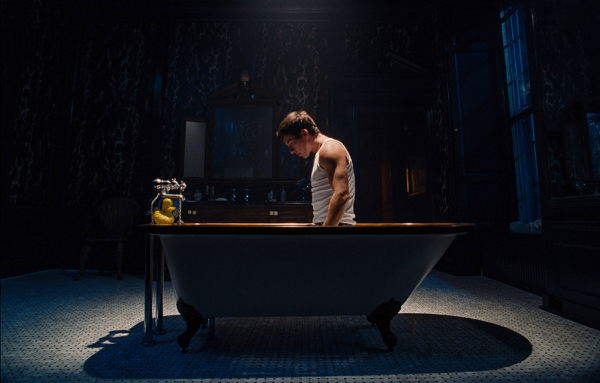Movie review by Greg Carlson
“Saltburn,” the highly anticipated follow-up to “Promising Young Woman” – which earned Oscar gold for Best Original Screenplay – doesn’t quite equal the bite and sting of writer-director Emerald Fennell’s feature debut, but not for lack of trying. The deafening buzz isn’t likely to translate into its predecessor’s award season accolades, but the curious will be drawn to Fennell’s wicked sense of bleak and black comedy, the simmering and fluid homoeroticism, and the fleshy display of shooting stars Barry Keoghan, Jacob Elordi, and their castmates. Fennell puts in the necessary work to balance on the fine line between wealth porn and eat-the-rich satire/social commentary.
The dynamic writer-director-producer–showrunner-performer, who turned just 38 in October, expands both her sense of scale and her shrewd eye for psychologically thrilling tension with the story of Keoghan’s pointedly monikered Oliver Quick, the proverbial “poor boy in a rich man’s house.” At Oxford on scholarship, Oliver obsesses over and bonds with Elordi’s fabulously wealthy golden child Felix Catton, whose family resides in the titular estate, a ridiculously opulent 127-room Northamptonshire palace known in real life as Drayton House. Fennell’s insistence on shooting all the principal domestic action on location, as well as her dogged pursuit of a spot previously unused for film or television, handsomely pays off.
Despite multiple warnings and constant reminders that he will eventually be cast off once Felix tires of him, Oliver makes himself at home, sizing up the pecking order of the staff led by commanding head butler Duncan (Paul Rhys) and the quirky members of Felix’s family: Lady Elspeth (Rosamund Pike), Sir James (Richard E. Grant), sister Venetia (Alison Oliver), and cousin Farleigh (Archie Madekwe). Fennell’s lacerating wit surges, sparks and crackles through each of Saltburn’s inhabitants, which also includes Carey Mulligan’s “Poor Dear” Pamela, a damaged friend who serves in part as a grim glimpse at Oliver’s possible future.
Fennell cranks up the wretched excess, infusing Oliver with enough mystery to keep the viewer curious about the character’s motivations and the extent to which he is the one doing the using versus the one being used. The filmmaker accomplishes this via several of the movie’s most controversial interactions, which include a slurped-up cocktail of bathwater and ejaculate, symbolic gravesite necrophilia, and, in an acknowledged nod to “Dracula,” some menstrual cunnilingus. The vampiric essence of the latter is already the subject of an intriguing essay by Samantha Bergeson (which also references Chloe Domont’s “Fair Play”) investigating the complexity of gender-based stereotypes and period sex.
Fennell indicated an interest in manipulating audience sympathy to align with unlikeable and abhorrent people, and this element of “Saltburn” links the film to the work of Hitchcock. It’s no fluke that multiple comparisons have also been made between Fennell’s movie and “The Talented Mr. Ripley,” but the homages, twists, and inversions extend to “Brideshead Revisited,” “The Great Gatsby,” “Jane Eyre,” “My Summer of Love,” “Burning,” “Parasite” and others. The soundtrack is equally evocative, using bullseyes from MGMT, Pet Shop Boys, the Killers, and many others. The centerpiece song, however, is Sophie Ellis-Bextor’s 2001 club banger “Murder on the Dancefloor,” which propels the most talked-about scene in a movie bursting with them.
